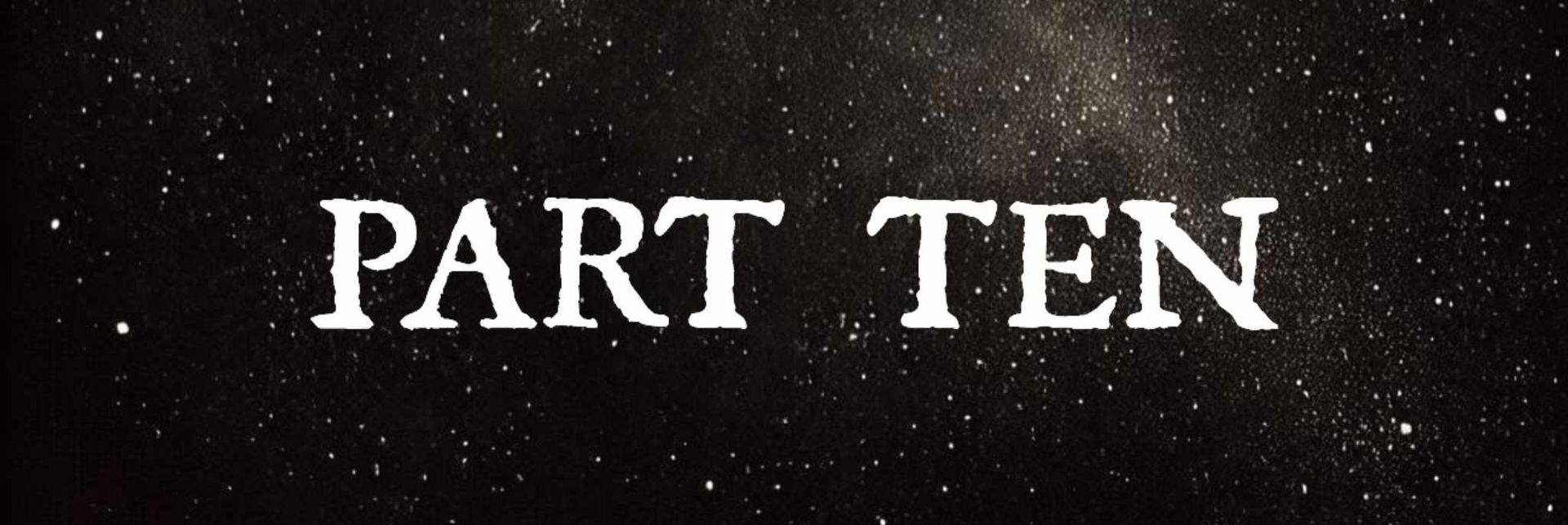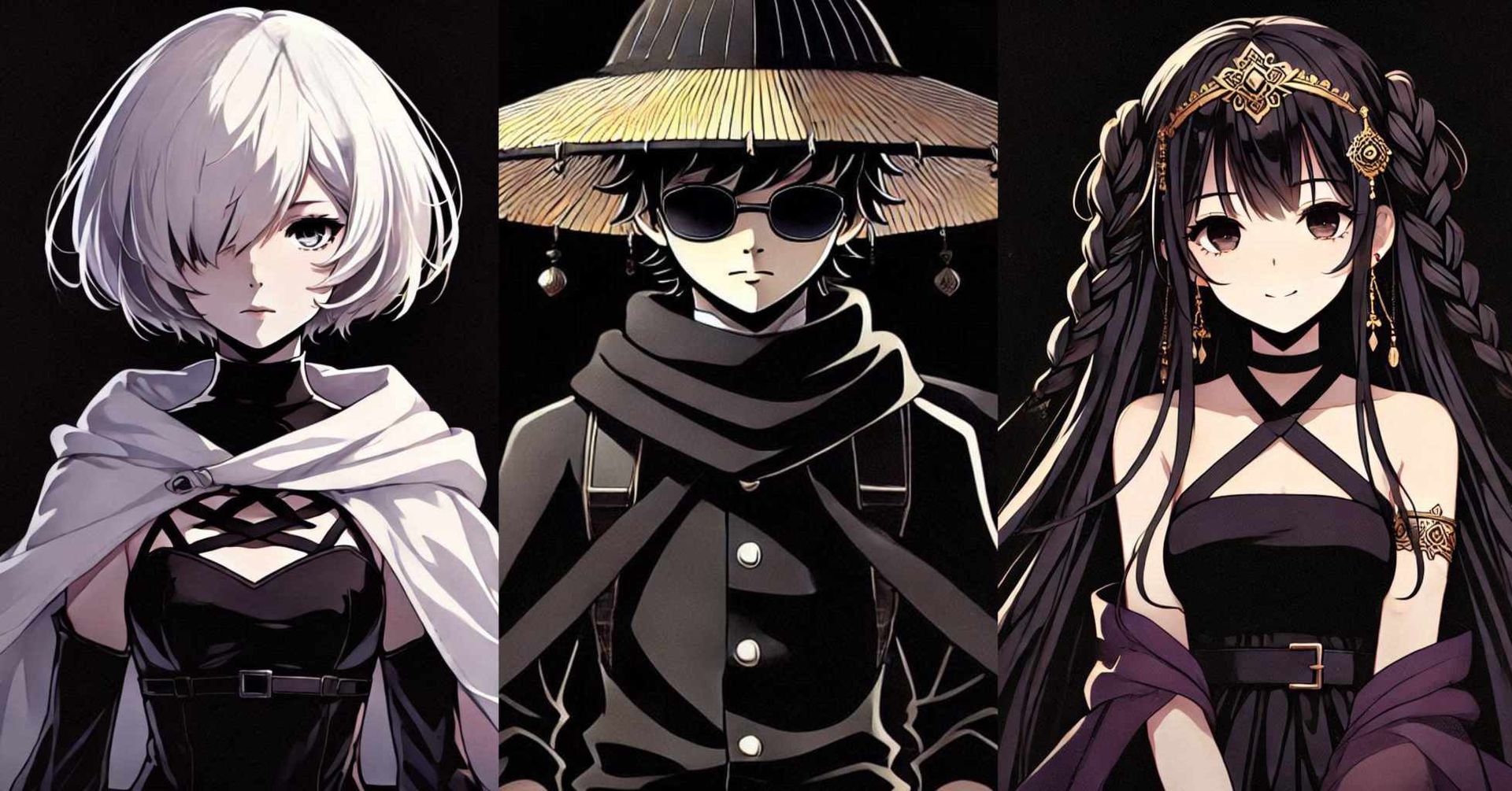Part 10

Just when I thought the night couldn't get any stranger, a peculiar group of people appeared before my brother and me—three bizarre-looking entities dressed in garments that seemed to blend ancient styles with modern elements. Their faces were adorned with intricate, artistic embellishments, adding to their fierce and intimidating presence, while also concealing certain features.
The metal gears stopped spinning above a tall man wearing a salakot (native hat), stoically standing at the center of the group. His eyes were hidden behind a pair of tinted dark shades, and a scarf filled with ethnic designs wrapped around his neck, covering part of his lower face. He wore a black sleeveless canga (traditional jacket), the usually open chest area buttoned down, with an extra trail draping over his rear and the backs of his legs. Securing it with a gold metallic belt, he wore long salwal (ethnic pants), the lower part hidden beneath tall leather boots adorned with intricate ancient patterns. Gold wristbands covered his wrists, engraved with elaborate tribal markings. He raised both hands to shoulder level, and the metal razors shrank down and disappeared into his hands like a little magic trick.
To his right was a girl with a cat-like grin and silver hair, as vibrant as the moon above. Her crescent-shaped, chin-high bob cut matched the boldness radiating from her. She wore a black catsuit with an open top, exposing her neck and the V-shaped indentation between her chest. A white shawl, shaped like an esclavina (native raincoat made from anahaw leaves), draped over her shoulders, matching the color of her hair and the half-moon earrings dangling from her ears. A black metal belt cinched her waist, paired with leather knee-high boots and elbow-length gloves, decorated with spiky metallic ornaments. But her most striking feature were the metal claws encrusted on both her hands, ready to slash anyone in her path.
On the other side stood another girl with a gentle expression. Her long black hair was arranged in intricate tirintas (pigtails), and a golden crown-like ornament adorned her forehead. Five golden earrings cascaded down her left ear. She wore a black tapis (a native cloth used to cover the body) wrapped around her chest, with a sleeveless canga on top. The canga, dark purple in hue, was long enough to cover the tapis, revealing her exposed midriff. She also wore a black saya (traditional skirt) with high slits on both legs, paired with black thigh-high boots. A golden armlet adorned her right arm, and her hands were encased in black gloves, reaching up to her wrists. On both her hands were a pair of bastons (Arnis sticks used in Kali), one resting on her shoulder, the other loosely hanging from her arm.
"Who are you?" I asked, turning fully to face them, standing slowly with my fists clenched. "What do you want from us?"
The three eccentric figures studied me, sizing me up.
"Mayari, what do you know about him?" The salakot-wearing man asked, glancing at the girl on his right before turning his gaze back to me.
Mayari? Is that her name? I silently pondered, trying to recall where I had heard it before.
"Makisig Kagiwa. Age: 15. 10th Grader. The younger brother of the target," the silver-haired girl recited. "He trained in Kali as a child but stopped in 7th grade. His skill level is undetermined but most likely average due to inactivity. No records of violent tendencies. Special abilities: nothing remarkable. My assessment: not a threat."
Hearing all this personal information from a stranger made me uneasy. How could someone I had never met before speak about me as if they knew everything about me?
What does she mean by "target"? Are they after my brother? I couldn't shake the feeling that, despite saving us from the Amalanhigs, these people might not have our best interests at heart.
"Understood," the tall man said, then shifted his gaze to my brother, who was still in intense pain.
I glanced at my brother and realized that, in his current condition, I was his only chance of getting out of this situation.
"Jin Kagiwa. Code Name: Lakan. Anarchy Class: Pinuno (Leader). Affiliation: Tribu Bughaw (Blue Tribe)," the tall man announced, leaving me utterly confused. "With the authority granted to me by The Anarchy, I request your unchallenged cooperation. Due to your actions in a recent operation, we are tasked with escorting you back to The Anarchy for further investigation. Refusal is futile. The order of The Anarchy is absolute."
My brother managed to turn to his side and face our strange visitors, but he was too weak to stand. He kneeled, pressing his right arm on the ground to keep himself from collapsing.
"Rajah!" my brother grunted, looking up at the tall man with a pained expression. If I was right, Rajah was the name of the man in the center of this odd trio. A name that meant "King," fitting for the superior aura he exuded.
"Lakan, I beg you. Submit to The Anarchy this time. This is for your own sake," the girl on the left said, her concern evident.
Maybe they weren't so bad after all, but I needed to be sure. And what exactly was The Anarchy? I silently wondered, weighing the situation as it unfolded before me.
"You don't understand. I need to stay here," my brother said defiantly. "The Scarlet Clan is still out there. I need to do this on my own, or I'll never have peace again. I'll never escape the images running through my head, and I'll never be free from my guilt. That's why I have to vanquish them with my own hands."
He looked down, punching the ground in frustration, trying to hide the bitterness on his face. His shoulders shook as he slowly sobbed.
I still didn't understand what was going on, but all I could guess was that they wanted to take my brother with them. He was so vehemently against it that he'd broken down in tears. I had never seen him like this before. Not even after our parents' death had he shown such vulnerability. Whatever it was that was hurting him, it was so much worse than I could have imagined.
"We are here to follow orders," Rajah said coldly. "And right now, our mission is to retrieve you and bring you back to The Anarchy, by any means necessary. You know what you signed up for, Lakan. There is no place for emotions in our world. Emotions will only make you vulnerable, putting everyone around you at risk. Once again, The Anarchy's order is absolute. Any form of defiance will be dealt with using force, regardless of the outcome."
I still wasn't sure about the true intentions of these peculiar strangers, but all I knew was that I had to protect my brother. It was impossible for him to do it on his own this time, but I promised myself I'd do my best to help him.
Without warning, I stepped in front of my brother, facing the three of them boldly. Rajah flinched, clearly displeased, while Mayari flashed a sly smile at me, and the other girl looked at me in surprise. I stood tall, arms spread wide, without a single care for my own life.

Author's Note:
Salakot — a traditional wide-brimmed hat, typically made from natural materials such as bamboo or rattan. It is often used by farmers and rural workers to protect themselves from the sun and rain.
Canga — a collarless shirt worn by pre-colonial Filipino men.
Salwal — traditional 'pants' or 'trousers'.
Esclavina — a traditional rain cape made from leaves and branches. This garment was historically used to provide protection against the rain.
Anahaw — a type of palm tree known for its large, fan-shaped leaves. It is the national leaf of the Philippines and is widely used for various purposes due to its strength and durability.
Tirintas — refers to 'braids' or 'plaits'. It is a term used to describe the style of hair that is intertwined to form a braided pattern. Braiding hair, or making tirintas, is a common practice in Filipino culture, often done for both practical reasons, such as keeping hair neat and manageable, and for decorative purposes.
Tapis — a traditional wraparound skirt worn by women. It is typically a rectangular piece of cloth wrapped around the waist and secured by tucking or fastening.
Saya — a traditional skirt worn by women.
Baston/Arnis Stick — a stick used as a weapon in training and combat, specifically in the Filipino martial art of Kali/Arnis. These sticks normally come in pairs.
Pinuno — means 'leader' or 'chief'.
Tribu/Tribo — refers to a tribe or an indigenous group of people.
Bughaw — means the color "blue".
Bạn đang đọc truyện trên: Truyen247.Pro